- Home
- J. G. Ballard
Empire of the Sun Page 5
Empire of the Sun Read online
Page 5
Now that the Japanese had won the war, Jim mused, perhaps life in Shanghai would return to normal. When the young soldier showed him the newspaper he carefully studied the photograph of fighter-bombers taking off from the Japanese carriers, scenes that he seemed to remember from his own dreams in his bedroom at the Palace Hotel on the eve of the war.
Lounging on the bed beside him, the soldier pointed to the assault aircraft, keen to impress Jim with this staggering feat of arms.
‘…ah…ah…’
‘Nakajima,’ Jim said. ‘Nakajima Hayabusa.’
‘Nakajima…?’ The soldier sighed deeply, as if the subject of military aviation was far beyond the grasp of this small English boy. In fact Jim recognized almost all the Japanese aircraft. British newsreels of the Sino-Japanese War openly derided the Japanese planes and their pilots, but Jim’s father and Mr Maxted always spoke of them with respect.
Jim was wondering how he could see his father when the guard corporal bellowed a command up the stairwell. The young private was terrified of this small and unpleasant corporal, clearly the most important rank in the Japanese Army. He put away his cigarette butt, picked up his rifle and dashed from the ward, waving a warning finger at Jim.
Glad to be alone, Jim immediately climbed out of bed. Through the window he could see a group of convalescent Chinese orphans on the balcony of the adjacent wing. In their European dressing-gowns – like Jim’s, donated by a local French charity – they spent all day staring at him. A metal fire-escape linked the two wings, blocked by heaps of sandbags packed against the windows in 1937 to protect them from stray shells fired across the river.
Bare-footed, Jim crossed the ward to its rear door. A narrow catwalk led between the sandbags, and the loose sand was littered with hundreds of cigarette ends thrown down by the bored French doctors. Picking his way through the pieces of broken glass, he set off along the fire-escape. A metal staircase ran to the opposite wing, linked by a rusting bridge to the ward below Jim’s.
Jim moved swiftly down the steps and crossed the bridge. Somewhere on this floor were his father and the survivors of the Petrel. The windows of the wards overlooking the gangway had been painted with blackout tar. Watched by the wide-eyed orphans, he followed the gangway around the wing. The rear door into the ward was bolted, but as he pulled at the handle the Chinese children ducked below their balcony. An armed Japanese soldier stood on the roof, shouting down into the well between the wings. Soldiers with fixed bayonets ran across the courtyard of the hospital, and a motorcycle with armed side-car swung through the entrance. Jim could hear boots and rifle butts ringing on the stone stairways, and a French nun’s voice raised in protest.
He crouched between the sandbags outside the locked door. Soldiers were moving along the gangway of the children’s ward, and sand poured through the rusting grilles. A klaxon sounded in the Avenue Foch, and Jim was convinced that the entire Japanese occupation forces in Shanghai were searching for him.
A bolt clattered, and the door opened into the darkened ward. In the brief glare of sunlight Jim saw the cave-like room crowded with bandaged men, some lying on the floor between the beds, and the nuns being pushed aside by Japanese soldiers with rifles and canvas stretchers. As the blanched faces of young British sailors turned towards the sun, a stench of sickness and wounds emerged from the dark chamber and enveloped him.
The Japanese corporal stared at Jim, crouching in his pyjamas among the cigarette ends. He slammed the door, and Jim heard him shout as he slapped one of the Japanese soldiers with his fist.
An hour later they had all gone, leaving Jim alone in the children’s ward. As the klaxons sounded from the Avenue Foch, he watched a military truck reverse into the hospital compound. The crew of the Petrel and the eight British civilians who had helped to rescue them were bundled down the staircases and loaded into the truck. Wounded men on stretchers lay under the legs of others barely able to sit.
Jim did not see his father, but the French sister told him that he had walked to the truck taking them to the military prison in Hongkew.
‘This morning one of your sailors escaped. It’s very bad for us.’ The sister stared at Jim with the disapproving gaze of the Japanese corporal. She was angry with him in that new way he had noticed in the past weeks, not for anything he had done but because of his inability to change the circumstances in which he found himself.
‘You live in Amherst Avenue? You must go home.’ The sister beckoned to a Chinese nun, who laid Jim’s freshly laundered clothes on the bed. He could see that they were eager to be rid of him. ‘Your mother will look after you.’
Jim dressed himself, fastened his tie and carefully straightened his school cap. He wanted to thank the sister, but she had already left to look after her orphans.
6
The Youth with the Knife
Wars always invigorated Shanghai, quickened the pulse of its congested streets. Even the corpses in the gutters seemed livelier. Throngs of peasant women packed the pavements of the Avenue Foch, outside the Cercle Sportif Français the vendors locked wheels as they jostled their carts against each other, lines of pedicabs and rickshaws ten abreast hemmed in the cars that edged forward behind a continuous blare of horns. Young Chinese gangsters in shiny American suits stood on the street corners, shouting the jai alai odds to each other. In the pedicabs outside the Regency Hotel the bar-girls sat in fur coats with their bodyguards beside them, like glamorous wives waiting to be taken for a ride. The entire city had come out into the streets, as if the population was celebrating the takeover of the International Settlement, its seizure from the Americans and Europeans by another Asian power.
Yet when Jim reached the junction of the Avenue Pétain and the Avenue Haig a British police sergeant and two Sikh NCOs of the Shanghai police force still directed the traffic from their cantilever bridge above the crowd, watched by a single Japanese soldier standing behind them. Armed Japanese infantry sat like sightseers in the camouflaged trucks that moved along the streets. A party of officers stood outside the Radium Institute, adjusting their gloves. Pasted over the Coca Cola and Caltex billboards were fresh posters of Wang Ching-Wei, the turncoat leader of the puppet regime. A column of Chinese soldiers overtook Jim in the Avenue Pétain, shouting slogans into the noisy air. They stamped away, clumsily marking time below the baroque façade of the Del Monte Casino, and then ran on past the greyhound stadium, a coolie army in pale orange uniforms and American-style sneakers.
Outside the tram station in the Avenue Haig the hundreds of passengers were briefly silent as they watched a public beheading. The bodies of a man and woman in quilted peasant clothes, perhaps pickpockets or Kuomintang spies, lay by the boarding platform. The Chinese NCOs wiped their boots as the blood ran into the metal grooves of the steel rails. A tram crowded with passengers approached, its bell forcing the execution party aside. It clanked along, connector rod hissing and throwing sparks from the overhead power line, its front wheels a moist scarlet as if painted for the annual labour union parade.
Usually Jim would have paused to observe the crowd. On the way home from school Yang would often drive by the Old City. The public stranglings were held in a miniature stadium with a scrubbed wooden floor and rows of circular benches around the teak execution posts, and always attracted a thoughtful audience. The Chinese enjoyed the spectacle of death, Jim had decided, as a way of reminding themselves of how precariously they were alive. They liked to be cruel for the same reason, to remind themselves of the vanity of thinking that the world was anything else.
Jim watched the coolies and peasant women staring at the headless bodies. Already the press of tram passengers was pushing them aside, submerging this small death. He turned away, tripping over the charcoal brazier in which a pavement vendor was frying pieces of battered snake. Drops of fat splashed into the wooden bucket, where a single snake swam, thrashing itself as it leapt at the hissing oil. The vendor lunged at Jim with his hot ladle, trying to cuff his head, but he slipped betwe
en the parked rickshaws. He ran along the blood-smeared tramlines towards the entrance of the depot.
He pushed through the waiting passengers and squeezed himself on to a concrete bench with a group of peasant women carrying chickens in wicker baskets. The women’s bodies reeked of sweat and fatigue, but Jim was too exhausted to move. He had walked over two miles along the crowded pavements. He knew that he was being followed by a young Chinese, probably a pedicab tout or a runner for one of Shanghai’s tens of thousands of small-time gangsters. A tall youth with a dead, boneless face, oily black hair and leather jacket, he had noticed Jim outside the greyhound stadium. Kidnappings were commonplace in Shanghai –before his parents learned to trust Yang, they insisted that Jim always drove to school with the governess. He guessed that the youth was interested in his blazer and leather shoes, in his aviator’s watch and the American fountain pen clipped to his breast pocket.
The youth stepped through the crowd and walked up to Jim, his yellow hands like ferrets. ‘American boy?’
‘English. I’m waiting for my chauffeur.’
‘English…boy. You come now.’
‘No – he’s over there.’
The youth reached forward, swearing in Chinese, and seized Jim’s wrist. His fingers fumbled at the metal strap, trying to release the watch-clasp. The peasant women ignored him, chickens asleep on their laps. Jim knocked away the youth’s hand, and felt fingers grip his forearm. Inside his leather jacket he had drawn a knife, and was about to sever Jim’s hand at the wrist.
Jim wrenched his arm away. Before the youth could seize him again, Jim hurled the wicker basket from the knees of the peasant woman on his right. The youth fell back, flailing with his heels at the squawking bird. The women jumped to their feet and began to scream at him. He ignored them and put away his knife. He followed as Jim ran through the queues of tram passengers, trying to show them his bruised wrist.
A hundred yards from the depot Jim reached the Avenue Joffre. He rested in the padlocked entrance to the Nanking Theatre, where Gone with the Wind had been playing for the past year in a pirated Chinese version. The partly dismantled faces of Clark Gable and Vivien Leigh rose on their scaffolding above an almost life-size replica of burning Atlanta. Chinese carpenters were cutting down the panels of painted smoke that rose high into the Shanghai sky, barely distinguishable from the fires still lifting above the tenements of the Old City, where Kuomintang irregulars had resisted the Japanese invasion.
The youth with the knife was still behind him, skipping and side-stepping through the crowd in his cheap sneakers. In the centre of the Avenue Joffre was the police checkpoint, its sandbagged emplacement marking the western perimeter of the French Concession. Jim knew that neither the Vichy police nor the Japanese soldiers would do anything to help him. They were watching a single-engined bomber that flew low above the racecourse.
As the plane’s shadow flashed across the road Jim felt the Chinese youth snatch his cap and grip his shoulders. Jim pulled himself away, and ran across the crowded street towards the checkpoint, ducking in and out of the pedicabs and shouting: ‘Nakajima…! Nakajima…!’
A Chinese auxiliary in a Vichy uniform tried to strike him with his stave, but one of the Japanese sentries paused to glance at Jim. His eye had caught the Japanese characters on the metal tag that Jim had taken from the derelict fighter at Hungjao Aerodrome and was now holding in front of him. Briefly tolerating this small boy, he continued his patrol and waved him away with the butt of his rifle.
‘Nakajima…!’
Jim joined the crowd of pedestrians moving through the checkpoint. As he guessed, his pursuer had vanished among the beggars and loitering rickshaw coolies on the French side of the barbed wire. Not for the first time Jim realized that the Japanese, officially his enemies, offered his only protection in Shanghai.
Nursing his bruised arm, and angry with himself for having lost his school cap, Jim at last reached Amherst Avenue. He pulled his shirt-sleeve over the dark weals that marked his wrist. His mother worried constantly about the danger and violence in the streets of Shanghai, and knew nothing of his long cycle rides around the city.
Amherst Avenue was deserted. The throngs of beggars and refugees had vanished. Even the old man with his Craven A tin had gone. Jim ran up the drive, looking forward to seeing his mother, sitting on the sofa in her bedroom and talking about Christmas. Already he assumed that they would never discuss the war.
A long scroll covered with Japanese characters had been nailed to the front door, the white cloth stamped with seals and registration numbers. Jim pressed the bell, waiting for Number Two Boy to open the door. He felt exhausted, as worn down as his scuffed shoes, and noticed that the sleeve of his blazer had been slashed from the elbow by the thief’s knife.
‘Boy, hurry…!’ He began to say: ‘I’ll kill you…’ but checked himself.
The house was silent. There was no sound of the amahs arguing over the laundry vat in the servants’ quarters, or the clip-clip of the gardener trimming the lawn around the flower-beds. Someone had switched off the swimming-pool motor, though his father made a point of running the filter all winter. Looking up at the windows of his bedroom, he saw that the shutters of the air-conditioner had been closed.
Jim listened to the bell drill through the empty house. Too tired to reach again for the button, he sat on the polished steps and blew on his bruised knees. It was difficult to imagine how his parents, Vera, the nine servants, chauffeur and gardener could all have gone out together.
There was a muffled explosion from the bottom of the drive, the coughing exhaust box of a heavy engine. A Japanese half-track had entered Amherst Avenue, its crew standing among their radio aerials. They moved along the centre of the road, forcing a Mercedes limousine from the German estate to climb the pavement.
Jim jumped from the porch and hid behind a pillar. A high wall faced with terracotta tiles ran around the house, topped with broken glass. Gripping the tiles with his fingertips, he climbed the wall below the barred cloakroom window. After pulling himself on to the concrete ledge, he crawled on his knees through the glass blades. During the past year, unknown to the gardener and the nightwatchman, he had climbed the wall a score of times, always removing a few more of the sharp spears. He lowered himself over the edge and jumped into the dark branches of the cedar tree behind the summer house.
In front of him was the enclosed and silent garden, even more Jim’s true home than the house itself. Here he had played alone with his imagination. He had been a crashed pilot on the roof of the rose pergola, a sniper sitting high in the poplars behind the tennis court, an infantryman racing across the lawn with his airgun, shooting himself down into the flower-beds and rising again to storm the rockery below the flagpole.
From the shadows behind the summer house Jim looked up at the verandah windows. An aircraft overhead warned him not to run too suddenly across the lawn. Although undisturbed, the garden seemed to have darkened and grown wilder. The uncut lawn was beginning to billow, and the rhododendrons were more sombre than he remembered them. Ignored by the gardener, his bicycle lay on the terrace steps. Jim walked through the thickening grass to the swimming-pool The water was covered with leaves and dead insects, and the level had fallen by almost three feet, draping a scummy curtain on the sides. Cigarette ends lay crushed on the white tiles, and a Chinese packet floated under the diving board.
Jim followed the pathway to the servants’ quarters behind the house. A charcoal stove stood in the courtyard, but the kitchen door was locked. He listened for any sound from within the house. Beside the kitchen steps was the enclosed hood of the garbage compactor. A chute ran from the compressor into the kitchen wall beside the sink. Two years earlier, when he was younger, Jim had terrified his mother by climbing through the chute as she arranged a dinner party menu with the houseboy.
This time there was no danger of the motor being switched on. Jim lifted the metal hood, climbed between the scythe-like blades and edged his way
through the greasy chute. The metal flap swung back to reveal the familiar white-tiled kitchen.
‘Vera! I’m home! Boy!’
Jim lowered himself on to the floor. He had never seen the house so dark before. He stepped through the pool of water around the refrigerator and entered the deserted hall. As he climbed the staircase to his mother’s bedroom the air was stale with the smell of strange sweat.
His mother’s clothes were scattered across the unmade bed, and open suitcases lay on the floor. Someone had swept her hairbrushes and scent bottles from the dressing-table, and talcum covered the polished parquet. There were dozens of footprints in the powder, his mother’s bare feet whirling within the clear images of heavy boots, like the patterns of complicated dances set out in his parents’ foxtrot and tango manuals.
Jim sat on the bed, facing the star-like image of himself that radiated from the centre of the mirror. A heavy object had been driven into the full-length glass, and pieces of himself seemed to fly across the room, scattered through the empty house.
He fell asleep at the foot of his mother’s bed, rested by the scent of her silk nightdress, below this jewelled icon of a small exploding boy.

 High-Rise
High-Rise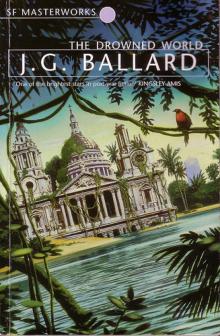 The Drowned World
The Drowned World The Unlimited Dream Company
The Unlimited Dream Company Running Wild
Running Wild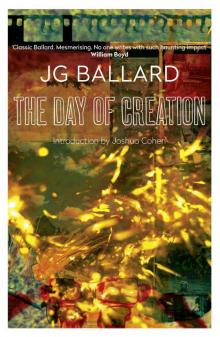 The Day of Creation
The Day of Creation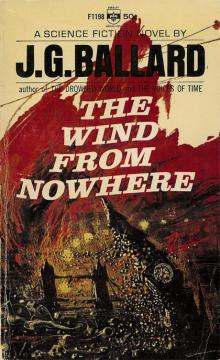 The Wind From Nowhere
The Wind From Nowhere The Complete Short Stories, Volume 2
The Complete Short Stories, Volume 2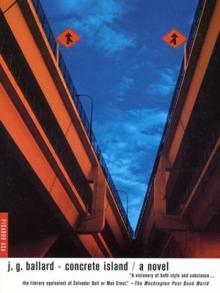 Concrete Island
Concrete Island Empire of the Sun
Empire of the Sun The Kindness of Women
The Kindness of Women Vermilion Sands
Vermilion Sands Super-Cannes
Super-Cannes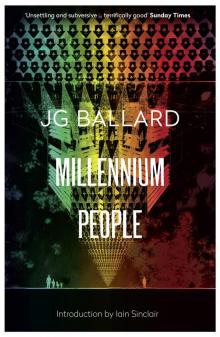 Millennium People
Millennium People The Complete Stories of J. G. Ballard
The Complete Stories of J. G. Ballard Crash
Crash The Drought
The Drought The Atrocity Exhibition
The Atrocity Exhibition The Complete Short Stories: Volume 1
The Complete Short Stories: Volume 1 Miracles of Life: Shanghai to Shepperton: An Autobiography
Miracles of Life: Shanghai to Shepperton: An Autobiography Rushing to Paradise
Rushing to Paradise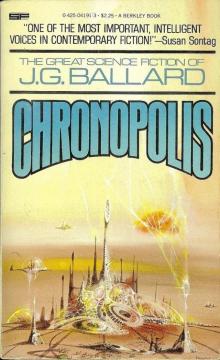 Chronopolis
Chronopolis Cocaine Nights
Cocaine Nights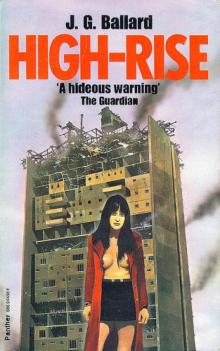 High Rise (1987)
High Rise (1987) The Complete Short Stories
The Complete Short Stories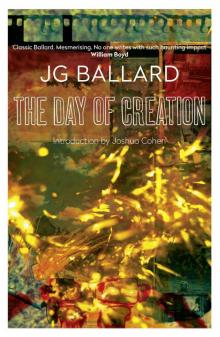 The Day of Creation (Harper Perennial Modern Classics)
The Day of Creation (Harper Perennial Modern Classics) The Crystal World
The Crystal World